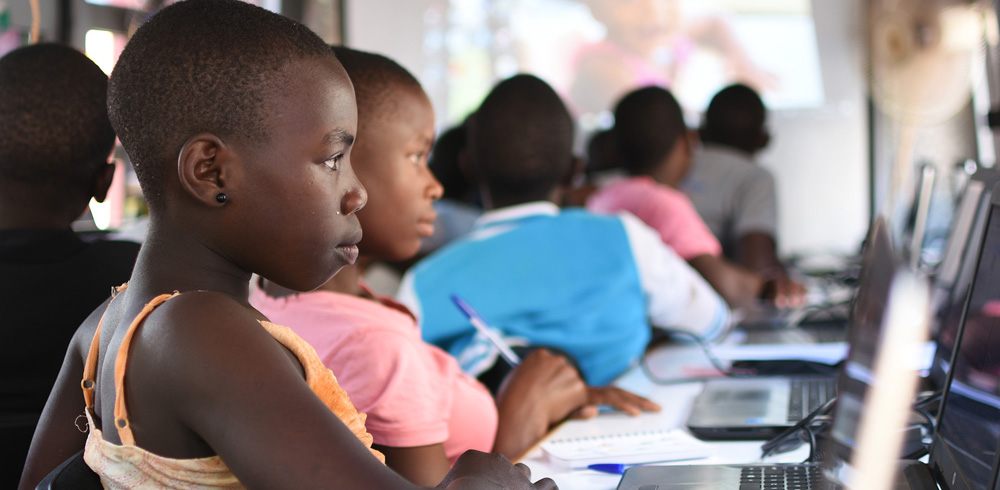
Who is acting collectively? | How it works | Find out more
In Kampala, Viva and CRANE run Creative Learning Centres (CLCs) for girls aged 10 to 18 who had dropped out of school to provide catch-up education.
Our initial programme helped 2,242 girls go back to school and our model of teaching has accelerated their literacy and numeracy learning. We aim to extend the reach of these teaching methods by developing a format that can be used in any school in Uganda.
The programme helps girls who are struggling with consistent patterns of school to remain in education and transition to the next stages to include higher learning, vocational or work-based learning for the older girls and girls with learning disabilities to become more independent, valued, contribute to the life of their family and community.
We expect to significantly contribute to the development of a more creative and competency-based national curriculum. CRANE is already engaged in various government working groups with the Ministry of Education and Sports and Kampala Capital City Authority and will continue to work with them on issues including special educational needs policy development and practice, child-centred creative teaching methods, safer schools with zero tolerance of corporal punishment and allowing girls who are pregnant to access education and sit national exams.
Four intermediate outcomes are:
- Increased attendance
- Inclusive education
- Quality teaching
- Attitudes of parents changed
This programme requires a broad range of expertise, volunteers and levels of cooperation. Network members provide volunteers, buildings for creative learning centres and assistance in programme delivery. The network works with local schools throughout the process of reintegration and to train teachers about creative learning.
The network is also working with city authorities and government officials to influence curriculum change and develop policies that could see the impacts of the programme replicated more widely than the network can reach.
Volunteers of network members are trained as community mentors to build relationships in their communities and identify girls who are out of school. They encourage these girls to join a CLC for six months where they are helped to catch up with their numeracy and literacy in low-ratio, mixed-ability, mixed-age classes with two teachers working together to give maximum support.
Whilst the girls are attending the CLC, Community Mentors work with their parents to help them understand the importance of girls’ education, manage household budgets and with income-generation training with this aim that they are able to support their daughters through school.
After 6 months, we aim for the girls to be reintegrated into mainstream school. To help to smooth this transition, we provide a school starter pack and can help with school fees where necessary.
The programme has developed to focus more on how to prevent girls dropping out of school. We are training teachers in creative learning methods to make school strong, creative, holistic, inclusive and protective (SCHIP).
- LIVE: to break the cycle of abuse, violence, exclusion, child marriage, poverty, weak parenting, broken education and limited literacy. Teaching competency-based skills will help girls to develop strategies for success, career development and overcoming life barriers. Extra-curricular learning opportunities such as IT and mobile libraries are encouraged.
- LEARN: to provide quality catch-up education for girls through our Creative Learning Centres (CLCs), using a variety of methods to suit different learning styles, with additional learning support for those who need it. Over the next 7 years we will support three pilot groups of ten students through teacher training college, with additional practice at our centres. These 30 young women have themselves graduated from CLCs and passed through secondary education.
- LAUGH: Girls are being helped to overcome abuse, rejection and failure with psychosocial support and learning therapy to build resilience and confidence. Safe Clubs teach children their rights and responsibilities and groups for parents offer training in holistic wellbeing, parenting, household strengthening, and adult literacy to help provide a smooth transition for children through to higher education.
- SCHIP: focuses on leadership and learning in mainstream schools by inspiring headteachers. We aim to enhance parent-teacher collaboration, attendance tracking, teacher performance, child safeguarding, school financial management and track student learning. The schools we work with will become SCHIP schools that provide Strong, Creative, Holistic, Inclusive, Protective learning environments that promote confidence and resilience and will help girls to achieve gender equality in the classroom and into adulthood.
If you would like to find out more about our work getting girls back to school or to read our latest programme reports, we would love to hear from you. Please contact us on (+44) 1865 811 660 or info@viva.org
If you would like to give to this work, click here and choose the option ‘Transforming Children Through Education’.
